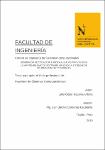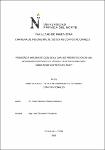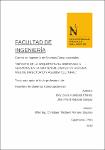| dc.contributor.advisor | Cárdenas Escalante, Lain Jardiel | |
| dc.contributor.author | Becerra Urbina, Julio César | |
| dc.date.accessioned | 2020-01-22T16:44:38Z | |
| dc.date.available | 2020-01-22T16:44:38Z | |
| dc.date.issued | 2019-11-19 | |
| dc.identifier.citation | Becerra, J. C. (2019). Generador de código de funcionalidades tipo crud en la mantenibilidad de software aplicado a sistemas de información empresariales (Tesis de licenciatura). Repositorio de la Universidad Privada del Norte. Recuperado de http://hdl.handle.net/11537/23234 | es_PE |
| dc.identifier.other | 005.1 BECE 2019 | es_PE |
| dc.identifier.uri | https://hdl.handle.net/11537/23234 | |
| dc.description.abstract | En el presente trabajo de investigación se realizó con el objetivo de demostrar que el
desarrollo y la aplicación de un software generador de código tipo CRUD favorece la
mantenibilidad de código aplicado a sistemas de información empresariales, por esta razón
sustentaremos que, escribiendo código con una baja complejidad, componentes
desacoplados, respetando las convenciones de nombres y líneas de comentarios descriptivos
para los métodos podemos lograr un alto índice de mantenibilidad de software.
Para el desarrollo de esta investigación se recolectó la información a través de un análisis de
código minucioso, donde gracias al uso de herramientas de software y métricas de código se
pudo establecer cuantitativamente que el proyecto de software desarrollado aumenta la
facilidad para realizar pruebas unitarias y realizar cambios al código generado.
Los resultados obtenidos demostraron que la facilidad para hacer pruebas unitarias mejoró
sustancialmente, validándose un cambio de FPU >23 (pre-test) a FPU<=8.8 (post-test) y la
facilidad para hacer cambios de la misma forma, validándose valores de FC>12000 (pre
test) a valores de FC<4650 (post-test). Estos valores reflejaron que la Mantenibilidad mejoró
significativamente obteniendo un incremento del Índice de Mantenibilidad desde un
IM<=49.81 (pre-test) a un IM>=82.43.
Con base en lo mencionado, se llegó a la conclusión que utilizar un software que genere una
arquitectura de código que respete los estándares de mantenibilidad favorece este criterio de
calidad de manera significativa, pero ya depende del programador continuar bajo la línea de
buenas prácticas al momento de realizar cualquier tipo de mantenimiento al software. | es_PE |
| dc.description.abstract | In the present research work it was carried out with the objective of demonstrating that the
development and application of a CRUD code generating software favors the maintainability
of code applied to business information systems, for this reason we will support that, writing
code with a low complexity, decoupled components, respecting the conventions of names
and descriptive comment lines for the methods we can achieve a high index of software
maintainability.
For the development of this investigation, the information was collected through a thorough
code analysis, where thanks to the use of software tools and code metrics it was
quantitatively established that the software project developed increases the ease to perform
unit tests and perform Changes to the generated code.
The results showed that the ease of doing unit tests improved, validating a change from
FPU> 23 (pre-test) to FPU <= 8.8 (post-test) and the facility to make changes in the same
way, validating FC > 12000 (pretest) at FC<4650 (posttest). These values correspond to the
Maintainability significantly improved obtaining an increase in the Maintainability Index
from an IM <= 49.81 (pre-test) to an IM> = 82.43.
Based on the aforementioned, it was concluded that using software that generates a code
architecture that respects the maintainability standards favors this quality criterion
significantly, but it is up to the programmer to continue under the line of good practices at
the moment to perform any type of maintenance to the software. | es_PE |
| dc.description.uri | Tesis | es_PE |
| dc.format | application/pdf | es_PE |
| dc.format | application/msword | es_PE |
| dc.language.iso | spa | es_PE |
| dc.publisher | Universidad Privada del Norte | es_PE |
| dc.rights | info:eu-repo/semantics/openAccess | es_PE |
| dc.source | Universidad Privada del Norte | es_PE |
| dc.source | Repositorio Institucional - UPN | es_PE |
| dc.subject | Sistemas de comunicación | es_PE |
| dc.subject | Sistemas de información administrativa | es_PE |
| dc.subject | Mantenimiento de software | es_PE |
| dc.title | Generador de código de funcionalidades tipo crud en la mantenibilidad de software aplicado a sistemas de información empresariales | es_PE |
| dc.type | info:eu-repo/semantics/bachelorThesis | es_PE |
| thesis.degree.grantor | Universidad Privada del Norte. Facultad de Ingeniería | es_PE |
| thesis.degree.level | Título Profesional | es_PE |
| thesis.degree.discipline | Ingeniería de Sistemas Computacionales | es_PE |
| thesis.degree.name | Ingeniero de Sistemas Computacionales | es_PE |
| dc.publisher.country | PE | es_PE |
| dc.subject.ocde | https://purl.org/pe-repo/ocde/ford#2.02.04 | es_PE |
| thesis.degree.program | Pregrado | es_PE |
| dc.description.sede | Trujillo San Isidro | es_PE |
| renati.advisor.dni | 18133704 | |
| renati.advisor.orcid | https://orcid.org/0000-0002-7273-7074 | es_PE |
| renati.author.dni | 46592607 | |
| renati.discipline | 612076 | es_PE |
| renati.level | https://purl.org/pe-repo/renati/level#tituloProfesional | es_PE |
| renati.type | https://purl.org/pe-repo/renati/type#tesis | es_PE |







